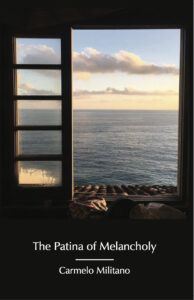By Caterina Edwards
The Patina of Melancholy
by Carmelo Militano
Ekstasis Editions (2023)
Where does your need to make art come from? What sustains that urge when you are no longer young and bursting with both promise and self-confidence? When your success feels slight and you do not have a community that challenges, stimulates, or respects you? Carmelo Militano tackles these questions and more in his latest book, The Patina of Melancholy, which tells the story of a man and a woman both searching “for art’s redemption and compass” (p. 24).
The man is a poet approaching middle age with slight success; the woman is younger, a painter at the beginning of her career. Once they become lovers, he begins to publish his books and she to sell her paintings. It is their passionate physical connection that releases them from “the world of feminine suburban banality” (p 46). He is freed from doubt, she from repression.
Carmelo Militano has published three books of poetry and five of prose, yet he brings the aesthetics and discipline of poetry to all his work. His sentences are beautiful: he makes words sing. “Above, the sky is round and open like a wide blue yawn” (p. 47). “The erotic, an ice pick to break the frozen sea inside him” (p. 15).
It took me a week to read this short book, because I read and reread slowly and with pleasure.
While most of the other characters are tagged with a first name, the man and woman remain nameless, identified only as he and she, and their anonymity adds an archetypal layer to their love story. The timeline of their relationship is scrambled; their story told through memories, reflections, and dreams. Some details contradict each other, others confuse. He and she first met in Winnipeg, or was it Lisbon? Did this scene happen before or after the last?
The book could be stamped with a content warning: there are numerous erotic scenes in the text between the two protagonists, but also with others. Which ones are to be taken as a true telling? And which have mutated over the years? Some of the sex seems so choreographed as to signal a fantasy. The poet himself is uncertain. “He no longer knows what he remembers is real or created, whether he can separate the fusing of his desire from his dream of her” (p. 53). After all, he says, “a writer is an artichoke…he grows thick prickly leaves to protect a soft purple core” (p. 117).
She is less convincing than him. The stream of her consciousness is too close to his in language and ideas. Besides, we have repeatedly seen her type in films or literature: a version of the manic pixie dream girl. She asks for nothing and gives everything except her inner self. She is unforgettable yet unknowable, a perfect muse. Still, at times, she deviates from the MPDG type. She is original in having agency, in going where women fear to go, breaking taboos, rejecting rules and authority.
Although The Patina of Melancholy is called a novel, it does not fit into the category of realistic fiction. A certain directness and specificity are missing. Instead, the book is a reverie, an evocation, a voyage into art, longing, loss and melancholy. Militano took a risk and nailed the jump. Bravo.
Caterina Edwards has published six books in various genres. Her literary noir – The Sicilian Wife – was named one of the Best Books of 2015 by The National Post. And her memoir, Finding Rosa, garnered awards in Canada and much critical success in Italy. Her next book is a biography of a strongman, professional wrestler, and folk hero, The Great Antonio. In 2016, Caterina was inducted into the City of Edmonton’s Cultural Hall of Fame.

